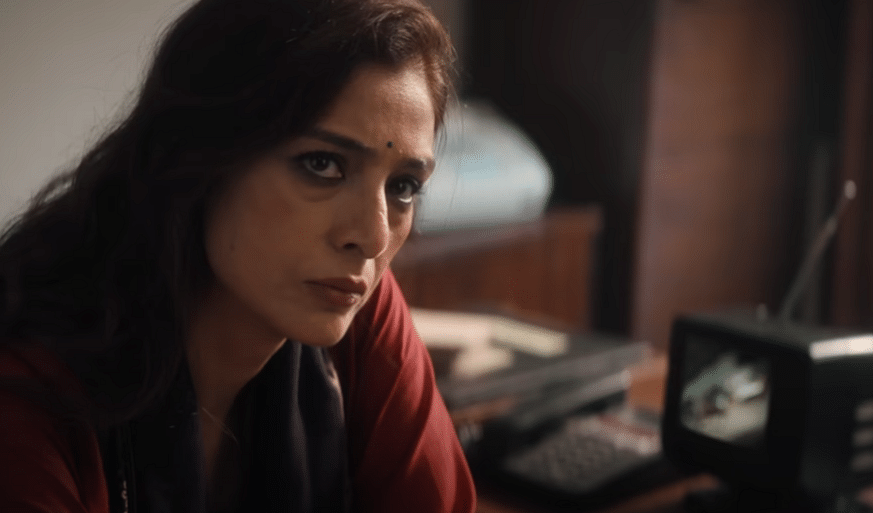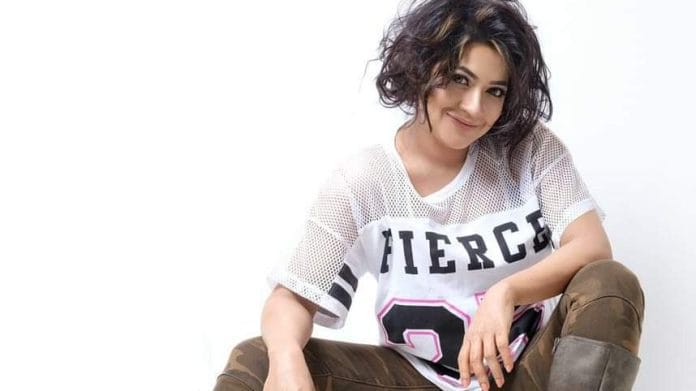Dhaka: Azmeri Haque Badhon laughs about the way her character in Khufiya, Heena Rehman, is introduced on screen. Starring Tabu, the Vishal Bhardwaj-directed film begins with the camera focussed on Badhon’s neck as Tabu’s voice can be heard in the background: “Strange, she was. Shrouded like a sin. Obvious like a sacred death. And sometimes, illogical like fate.”
Talking to ThePrint over phone from Dhaka, a day before Khufiya released on Netflix, the Bangladeshi actress says playing Tabu’s lover on screen was a fantasy come true.
“I am a big fan. The way she acts, the roles she chooses to play—so different from the choices many of her peers in Bollywood make—fascinate me. To play her lover on screen and share almost all of my screen time in Khufiya with her, was the highpoint of my Bollywood debut,” she says.
The film, which also stars Wamiqa Gabbi, Ali Fazal, and Ashish Vidyarthi, is about the shadowy world of spies, secrecy, and deceit. There is R&AW, ISI, and the CIA, but at its core, Khufiya it is the love story of two women, trying to hide from the world what they feel for each other.
“I had thought Tabu would be this big Bollywood star with an air about herself. When I met her, she was humble, friendly and made me feel so comfortable. On the first day of rehearsal, she served coffee to everyone on set. I fell in love with the person she is. To play her lover on screen was easy after that,” says Badhon.

Addressing homophobia
Badhon says homosexuality is not a comfortable topic for discussion in Bangladesh. Eyebrows will be raised and her choice of role for a Bollywood debut will be questioned as more and more people watch Khufiya. But Badhan doesn’t care anymore.
“I will turn 40 soon. My life started at 35. There was a Badhon before and a Badhon after. Before, I used to live for family, friends, society. The Badhon today lives for herself, free from the shackles society had put on her. If as an actor I cannot choose the type of roles I want to portray on screen, what is the point of being free?” she asks.
Badhon says she is not homophobic herself though society at large is. “Director Vishal Bhardwaj told me beforehand that there would be a lesbian angle to the story. He asked me if I would be comfortable playing such a role. For me, what mattered was a Vishal Bhardwaj film as my Bollywood debut and the chance to act with Tabu. As far as my role in Khufiya is concerned, it is a small but powerful one. In a sense, the entire plot revolves around her and what happens to her,” says Badhon.

Badhon hopes seeing her romance Tabu on screen, there would be conversations around homosexuality in Bangladesh. “We know there are people with different sexual orientations among us but we choose not to talk about them. As a country, Bangladesh gives everyone the right to live free but our society is narrow-minded. If a gay couple is killed for being gay, there are people who would justify the murder by saying they asked for it,” says Badhon.

Also read: Vishal Bhardwaj almost didn’t make Khufiya. Irrfan Khan scolded him for it
Cinema as activism
Strong roles attract Badhon who wants cinema to start conversations around topics that are often brushed under the carpet. A graduate in dental surgery from Bangladesh Dental College in Dhaka, Badhon never got the chance to be a professional dentist because of an early marriage and divorce. While she doesn’t want to remember that dark chapter anymore, what she won’t forget is being vocal about the marital rape and the chronic depression she has lived with most of her life.
“I am naturally drawn towards the kind of role I play in Khufiya. Life has taught me that romancing heroes on snow-clad mountains wearing sleeveless blouses is a big lie. We grew up watching such movies and dreaming of fairy tales. And then came the big crash and the struggle for survival. As an actress today, I want my cinema to look into life as honestly as possible,” she says.

But in Bangladesh, Badhon says actresses are not respected. “People may not say it on your face or sometimes they would, but they think of us rather disrespectfully. It doesn’t help that I am not only an actress, but I have also lived the kind of life I had,” she sighs.
Badhon got married a second time, which ended in a divorce in 2014.
In a society where homophobia can lead to severe consequences, the struggles of individuals like Badhon highlight the urgent need for change and acceptance.
“This time, I hid my divorce from family, friends and colleagues. Maybe I was always a good actor! I could not come to terms with the fact that even my second marriage did not last. Was I such a bad person? But my biggest fear was who would marry the daughter of a woman like me,” she says.
When Badhon told her therapist that she feared for her daughter’s marriage prospects, he asked her how old her daughter was. Badhon told him she was five years old. The therapist had laughed and said marriages may end by the time her girl grows up!
Badhon looks back at that time of her life and wonders where she got the strength to survive. “I guess it is my daughter. It is her birthday today. She turns 12. I grew up with her. She gave me the strength to fight and to never give up,” she says.
The battle for daughter Sayera has been the toughest battle in Badhon’s life so far. “Under Sharia law, a child’s natural guardian is her father. It was an uphill task in the courts to bypass that law and prove that I am capable of being the guardian to my daughter. I had to scream at every step, go through legal hurdles to get Sayera back. It showed me more than ever before that this idea that a woman always needs the protection of a male guardian needs to change,” Badhon says.
The women in Khufiya don’t need men to get things done. And that is also what piqued Badhon’s interest in the script apart from the chance to work with Tabu. “Even in the high-stake game played by spies, it is the women in Khufiya who are making all the moves. And that is how it should be,” she says.
Badhon rues the fact that is sadly not how it is always. “In Bangladesh, the prime minister is a woman. The leader of the principal opposition party is a woman. There are women in top corporate jobs and in the public sector. Yet, there are child marriages, rapes, trafficking. I do not want Sayera to inherit this world. It makes me depressed.”
It is at such times Badhon realises the power of cinema and its role in starting difficult conversations.
Also read: Why Vishal Bhardwaj picked Agatha Christie’s least known novel for Charlie Chopra
Bollywood yes, dancing around tress no
The positive reviews and praise for her acting in Indian and Bangladeshi press has elated Badhon. But she wants to pursue her Bollywood dreams without taking her thinking cap off. She has not forgotten the film that changed her life and the way the world looked at her and also moulded her cinema choices.
In the 2021 film, Rehana Maryam Noor, written and directed by Abdullah Mohammad Saad, Badhon played the title role of a teacher at a private medical college. Rehana is used to a difficult life as a mother, daughter, sister, and teacher. One day, she witnesses a sexual assault where she knows both the victim and the perpetrator. Noor decides to speak up, but there is a price to pay. It was a film so close to her reality that Badhon and Noor became one entity.

The film was selected as the Bangladeshi entry for the Best International Feature Film at the 94th Academy Awards. At the Cannes, after the film was screened, an elderly French lady sought out Badhon, held her, and cried. “I cried too. It was cathartic,” Badhon says.
At the 14th Asia Pacific Screen Awards, Badhon won the Best Actress award and got the Hong Kong Asian Film Festival award in the New Talent category for her role.
While she knows every film that she picks won’t be like Rehana Maryam Noor, she is choosy about her roles. “I want to do satire. I want to do a high-voltage action film as well. But I want to be convinced about the roles I play. I would love to have talented co-stars with me in a project of my choosing. But I do not crave a film with a big hero, Bollywood or otherwise. After all, I am the hero!” she laughs.
(Edited by Prashant)







This is very well-written. Kudos!